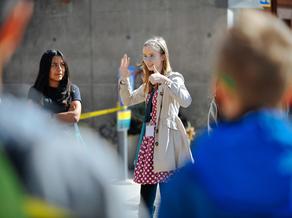Los Alamitos High School 10th grader Jamie Ostmann helped train 90 youth student delegates at the Algalita Marine Research and Education’s third international youth leadership summit recently at the Dana Point Ocean Institute. Delegates came from as far away as Hawaii, India, Africa and the Caribbean to attend.
Ostmann joined students from around the world including McGaugh Elementary 5th graders Pia Hirsch and Daniel Hoefler to learn the skills needed to convince their communities to reduce ocean plastic pollution, a particularly timely topic.
This month the Journal of Science published what the New York Times called “the most ambitious effort yet to estimate how much plastic debris ends up in the sea.” Annualy, there is 8 million metric tons of plastic debris that ends up in the ocean, and its the equivalent of stuffing grocery bags with plastic trash and lining them end to end along every foot of the world’s coastline.
The youth summit gathered “some of the brightest kids in Southern California” and around the world, said Oceanographer and Algalita founder Charles Moore.
As a peer advisor Ostmann helped teach delegates public speaking and leadership skills to spread the meaning of the “the tremendous plastic load the ocean bears,” a message
It is marvelously translated (by these students) into terms that are easily understood by city councils, said Moore.
Moore discovered the Great Pacific Garbage Patch in 1997, a swirling, growing, plastic cesspool twice the size of Texas in the Pacific’s northeastern gyre. On a recent research voyage, he and his crew found a plastic island, roughly the size of a public swimming pool, more than 50 feet of artificial, mountainous watery landfill with beaches, a rocky coastline, and reefs of ropes, buoys and plastic debris.
At the leadership summit, peer advisors like Ostmann helped give delegates the tools and confidence to make real change, to “stand up for themselves and what they believe in,” said Youth Summit Program Director Katie Allen. “Older people have given up. They’ve pushed it off on the younger generation.”
To halt the growing volume of plastic ocean pollution, Algalita and its student ambassadors have supported bans on plastic grocery bags, successfully passed in 100 cities and counties in California, including Los Angeles and San Francisco. Nationwide, Chicago, Austin and Seattle have also prohibited plastic bags, as have all of Hawaii’s counties. In California, on track to become the first state in the nation to ban plastic bags, a lobbying association spent more than $3 million dollars to derail the ban put the law on an upcoming ballot initiative.
Unless nations take “strong measures to dispose their trash responsibly,” the New York Times reported, “by 2025, people will pour the equivalent of 4 million elephants, 16 million tons of plastic into the world’s oceans. If elephants were like plastic and never disappeared, there would be 25 million elephants a 100 million tons of them in the ocean in 10 years, floating and bobbing along the currents and swirling gyres, circulating the world, clogging coastlines from California to Sumatra, landing on the remotest beaches and in arctic sea ice.
The message to the delegates at the youth summit was simple. “Be brave, get out there, and speak from the heart,” said Ostmann, and embrace the summit’s call to action. We are the solution.”

